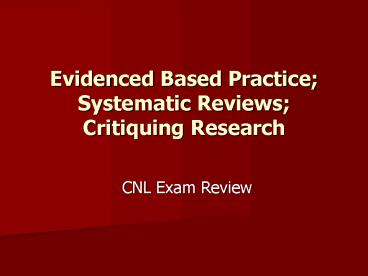Evidenced Based Practice; Systematic Reviews; Critiquing Research - PowerPoint PPT Presentation
1 / 17
Title:
Evidenced Based Practice; Systematic Reviews; Critiquing Research
Description:
Evidenced Based Practice; Systematic Reviews; Critiquing Research CNL Exam Review Evidence-Based Practice Conscientious integration of best research evidence with ... – PowerPoint PPT presentation
Number of Views:151
Avg rating:3.0/5.0
Title: Evidenced Based Practice; Systematic Reviews; Critiquing Research
1
Evidenced Based Practice Systematic Reviews
Critiquing Research
- CNL Exam Review
2
Evidence-Based Practice
- Conscientious integration of best research
evidence with clinical expertise and patient
values and needs in the delivery of high-quality,
cost-effective health care - Synthesis of knowledge for development of
guidelines, standards, protocols, or policies to
direct nursing interventions and practice
3
Evidence-Based Practice
- Hospital Priorities
- Pressure Ulcers
- Falls
- Hospital Acquired Infections
- Reducing costs
- Improving patient and staff satisfaction
- Reducing errors
- communication
4
Evidenced-Based Practice
- Masters prepared
- Innovators
- Early adopters
- Application
- Evaluate Merit
- Clinical Relevance
- Sufficiency of research base
- Pilot change
- Monitor Outcomes
5
Creating an EBP Culture
- Value Reflection
- Develop rituals
- Ask why
- Is there evidence to support it?
- Is it best for patients?
- Are there better ways?
- Share concerns-multidisciplinary
- Gather information
6
Intellectual Research Critique
- A careful examination of all aspects of a study
to judge - Merits
- Limitations
- Meaning
- Significance
- Bias
7
Critique Skills
- Critical thinking
- Logical reasoning
- Knowledge of research methodology
- Attention to details
- Recognition of strengths and weaknesses
8
(No Transcript)
9
Levels of Evidence
10
Rigor in Random Control Studies
- P lt .05
- Sample size
- Reliability of measures
- Control confounding variables
- Replication
11
Types of Systematic Reviews
- Meta-Analysis-random control trials
- Systematic Review-other quantitative studies
- narrative findings
- Meta-Synthesis
- Pitfalls
- Literature reviews
12
Common Threads
- Problem Formation
- Clearly identified problem and variables
- Identified prior to searching the literature
- Inclusion and exclusion criteria
- Comprehensive Search
- Published and unpublished work
- Networking
- Conferences
- Dissertations
- Two independent selectors
13
Common Threads (cont)
- Data Evaluation
- Primary studies evaluated for rigor
- Reliability and validity coding
- Two independent evaluators to establish
inter-rater reliability - Quality scores
- Data Analysis/Findings
- Thorough interpretation of studies
- Visual aides to describe studies
- Identification of potential threats and bias
14
Systematic Review
- Summarize findings regarding a clinical problem
- Studies have related or identical hypotheses
- Quantitative designs
- Narrative findings
15
Meta-Analysis
- Randomized control studies
- Testing interventions
- Studies have related or identical hypotheses
- Statistical Findings
- Measure the magnitude of a common effect
- Test for homogeneity
- Explain heterogeneity
- High level of evidence
16
Meta-Synthesis
- Qualitative studies
- Related phenomena
- Develop theory
- Rigor
- Participants and/or primary authors agree with
interpretations - Used for enhancing the experience
- Moderate level of evidence
17
Levels of Evidence































